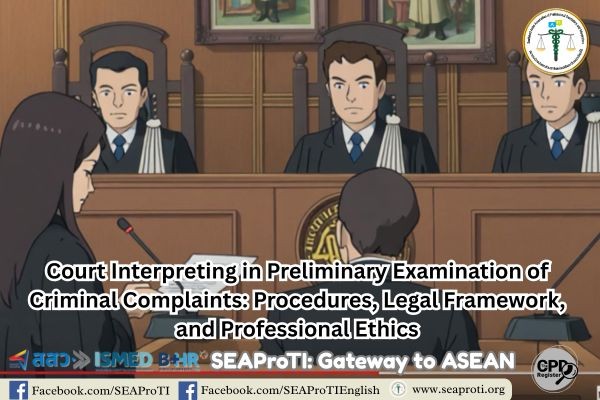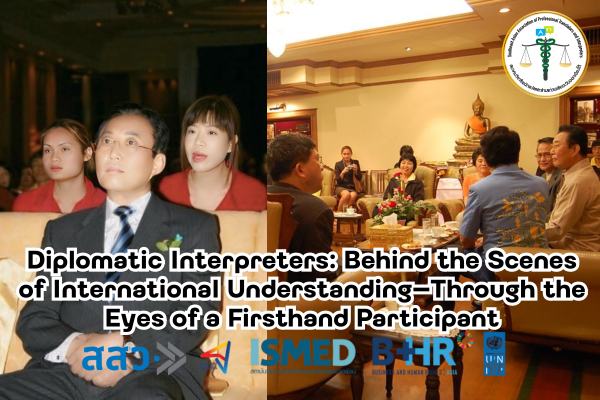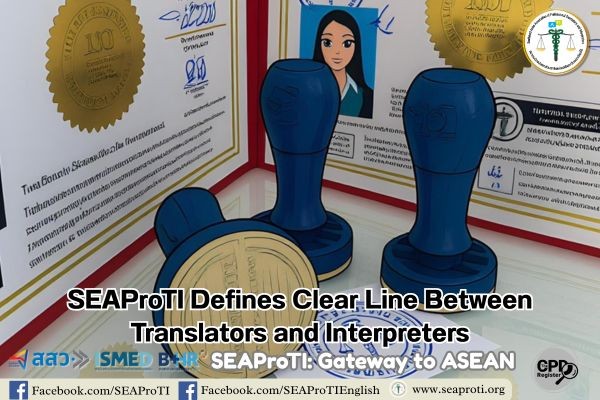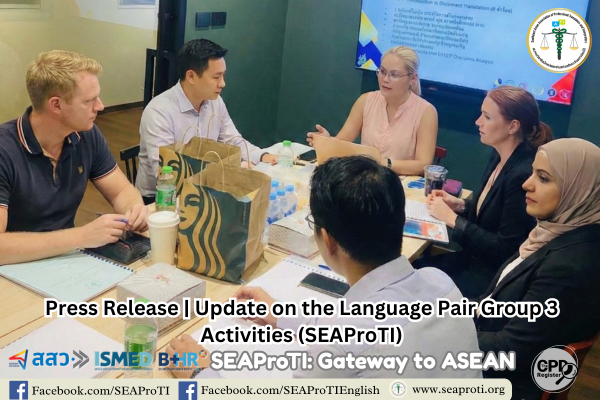Court Interpreting in Preliminary Examination of Criminal Complaints: Procedures, Legal Framework, and Professional Ethics in Thai Courts
16 November 2025, Bangkok — The preliminary examination of criminal complaints is a critical mechanism in the criminal justice process, functioning as an initial filter to determine whether a case contains sufficient grounds to proceed. The court evaluates whether the complaint is substantiated before issuing an order to accept or dismiss the case. The role of interpreters in this stage is particularly sensitive, as the accuracy of interpretation directly affects the parties’ understanding and may influence the court’s discretion in determining whether the case has merit. This article presents the legal framework, operational procedures, and professional ethics required of interpreters during the preliminary examination, linking Thai legal principles to international standards of court interpreting practice.
The preliminary examination is conducted to determine whether there is reasonable cause to believe that the accused has committed an offence. If the court finds that the complaint lacks merit, the case may be dismissed immediately, preventing the accused from becoming a “defendant,” a procedural status that carries more severe legal implications. Interpreters working in this stage must therefore possess both linguistic and legal competence to ensure that proceedings are conducted fairly and consistently with the human rights safeguards enshrined in the Constitution and the Criminal Procedure Code.
The Importance of Interpreters in the Preliminary Examination of Criminal Complaints
Interpreters serve as conduits between the court, the parties, and the accused. Inaccurate interpretation can lead to misunderstandings regarding facts or legal issues, potentially affecting an individual’s liberty. Individuals who do not understand Thai must be afforded equal access to the judicial process. The presence of a qualified interpreter is therefore an integral component of the constitutional right to justice (Constitution of the Kingdom of Thailand, 2017).
Legal Framework
Criminal Procedure Code of Thailand
The Criminal Procedure Code prescribes provisions related to the rights of non-Thai-speaking parties and the use of interpreters, including:
- Section 13: If a party does not understand Thai, the court must appoint an interpreter.
- Sections 15 and 19: Guarantee the accused’s right to understand the proceedings.
- Section 158: Requires the court to conduct a preliminary examination before accepting a criminal complaint.
- Sections 226/1–226/3: Govern the accuracy and completeness of interpreted questions and testimonies in court.
Constitution of the Kingdom of Thailand (2017)
Section 40 guarantees the right to a fair trial and the right to receive information in a comprehensible manner.
International Professional Standards for Court Interpreters
Standards established by international professional bodies, such as the International Association of Conference Interpreters (AIIC), the National Association of Judiciary Interpreters and Translators (NAJIT), and regional professional associations such as SEAProTI, emphasize core ethical principles including impartiality, accuracy, and confidentiality, which align with the principles recognized under Thai law.
Operational Procedures for Interpreters in Preliminary Examination
Preparation Before the Hearing
- Review documents permitted by the court, including the complaint and allegations.
- Study legal terminology relevant to the case.
- Assess the linguistic background and communication needs of the accused.
- Inform the court of the interpretation mode to be used, such as consecutive interpreting.
Duties During the Examination
- Interpret questions and answers faithfully and accurately.
- Avoid adding, omitting, or modifying information.
- Request clarification from the court if the message is unclear or ambiguous.
- Maintain professional distance and refrain from unsolicited communication with the parties.
- Preserve the tone, register, and intent of the original utterances.
Post-Interpretation Verification
- Ensure that no information has been omitted.
- Confirm the accuracy of the court record in relation to the interpreted statements.
- Immediately inform the court if an error is identified during or after the testimony.
Professional Ethics for Court Interpreters
Impartiality: Interpreters must not take sides and must avoid conduct that may appear to influence the parties or the court.
Accuracy: Interpretation must be complete, faithful, and reflective of the original meaning without distortion.
Confidentiality: Given the sensitive nature of criminal proceedings, all information must remain confidential under both legal and ethical requirements.
Professional Integrity: Interpreters must notify the court if they encounter terminology or circumstances beyond their competence.
Responsibility for the Impact of Interpretation: As interpreted statements may affect a person’s liberty, interpreters must uphold the highest professional standards.
Risks Arising from Inaccurate Interpretation in Preliminary Examinations
Errors in interpretation—such as misinterpretation, inappropriate word choices, or contextually incorrect translations—may lead the court to misunderstand key factual or legal issues, affecting its decision on whether the case has merit. Examples include the use of words that convey a stronger meaning than the original utterance, unintended summarization, or reliance on personal assumptions inconsistent with the speaker’s intent.
Conclusion
Interpreters in preliminary examinations must adhere to strict standards of accuracy, neutrality, and professionalism, as each interpreted utterance may influence both individual rights and judicial outcomes. A comprehensive understanding of the legal framework, operational procedures, and professional ethics is therefore indispensable for interpreters engaged in criminal proceedings.
References
- AIIC. (2018). Code of professional ethics. International Association of Conference Interpreters.
- National Association of Judiciary Interpreters and Translators. (2016). Code of ethics and professional responsibilities. NAJIT.
- Criminal Procedure Code, B.E. 2477 (1934) (Thailand).
- Constitution of the Kingdom of Thailand, B.E. 2560 (2017).
- SEAProTI. (2024). Professional standards and code of conduct for translators and interpreters in Southeast Asia. Southeast Asian Association of Professional Translators and Interpreters.
About Certified Translators, Translation Certifiers, and Certified Interpreters of SEAProTI
The Southeast Asian Association of Professional Translators and Interpreters (SEAProTI) has formally announced the qualifications and requirements for registration of Certified Translators, Translation Certification Providers, and Certified Interpreters in Sections 9 and 10 of the Royal Gazette, published by the Secretariat of the Cabinet, Office of the Prime Minister of Thailand, on 25 July 2024 (Vol. 141, Part 66 Ng, p. 100). Certified Translators, Translation Certification Providers, and Certified Interpreters
The Council of State has proposed the enactment of a Royal Decree, granting registered translators and recognized translation certifiers from professional associations or accredited language institutions the authority to provide legally valid translation certification (Letter to SEAProTI dated April 28, 2025)
SEAProTI is the first professional association in Thailand and Southeast Asia to implement a comprehensive certification system for translators, certifiers, and interpreters.
Head Office: Baan Ratchakru Building, No. 33, Room 402, Soi Phahonyothin 5, Phahonyothin Road, Phaya Thai District, Bangkok 10400, Thailand
Email: hello@seaproti.com | Tel.: (+66) 2-114-3128 (Office hours: Mon–Fri, 09:00–17:00)
ล่ามในงานไต่สวนมูลฟ้อง: ขั้นตอนปฏิบัติ กรอบกฎหมาย และจรรยาบรรณวิชาชีพ ในศาลไทย
16 พฤศจิกายน 2568, กรุงเทพมหานคร – การไต่สวนมูลฟ้องเป็นกลไกสำคัญของกระบวนการยุติธรรมทางอาญาที่มีบทบาทในการคัดกรองคดีตั้งแต่ชั้นต้น โดยศาลจะพิจารณาว่าคดีมีมูลเพียงพอหรือไม่ก่อนมีคำสั่งรับฟ้องหรือยกฟ้อง การทำหน้าที่ล่ามในชั้นนี้จึงมีความละเอียดอ่อนเป็นพิเศษ เนื่องจากการแปลที่ถูกต้องมีผลต่อความเข้าใจของคู่ความ รวมถึงมีผลต่อดุลพินิจของศาลในการวินิจฉัยมูลคดี บทความนี้นำเสนอกรอบกฎหมาย ขั้นตอนปฏิบัติงาน และจรรยาบรรณวิชาชีพสำหรับล่ามในชั้นไต่สวนมูลฟ้อง โดยเชื่อมโยงหลักกฎหมายไทยเข้ากับมาตรฐานวิชาชีพล่ามระดับสากล
การไต่สวนมูลฟ้องเป็นกระบวนการที่ใช้พิจารณาความมีเหตุอันควรเชื่อว่าผู้ถูกกล่าวหากระทำความผิดหรือไม่ หากศาลเห็นว่าคดีไม่มีมูล ศาลมีอำนาจยกฟ้องทันที ทำให้ผู้ถูกกล่าวหาไม่ต้องเปลี่ยนสถานะเป็น “จำเลย” ซึ่งเป็นสถานะที่มีผลทางกระบวนพิจารณาที่เข้มข้นกว่า การทำหน้าที่ล่ามในกระบวนการนี้จึงต้องมีความรู้ทั้งด้านภาษาและกฎหมายควบคู่กัน เพื่อให้การพิจารณาคดีเป็นไปอย่างเป็นธรรมและถูกต้องตามหลักสิทธิมนุษยชนที่ได้รับการรับรองในกฎหมายทั้งระดับรัฐธรรมนูญและประมวลกฎหมายวิธีพิจารณาความอาญา
ความสำคัญของล่ามในชั้นไต่สวนมูลฟ้อง
ล่ามในชั้นไต่สวนมูลฟ้องทำหน้าที่ถ่ายทอดข้อมูลระหว่างศาล คู่ความ และผู้ถูกกล่าวหา การแปลที่ไม่ถูกต้องอาจนำไปสู่ความเข้าใจผิดเกี่ยวกับข้อเท็จจริงหรือข้อกฎหมาย ซึ่งอาจกระทบต่อเสรีภาพของบุคคลได้โดยตรง บุคคลที่ไม่เข้าใจภาษาไทยต้องได้รับโอกาสในการรับรู้กระบวนการพิจารณาอย่างเท่าเทียม การมีล่ามจึงเป็นส่วนหนึ่งของสิทธิการได้รับความยุติธรรมที่รัฐธรรมนูญให้การรับรอง (รัฐธรรมนูญแห่งราชอาณาจักรไทย พ.ศ. 2560)
กรอบกฎหมายที่เกี่ยวข้อง
ประมวลกฎหมายวิธีพิจารณาความอาญา
ประมวลกฎหมายวิธีพิจารณาความอาญากำหนดบทบัญญัติที่เกี่ยวข้องกับสิทธิของผู้ไม่เข้าใจภาษาไทยและการใช้ล่าม ซึ่งได้แก่
- มาตรา 13: หากคู่ความไม่เข้าใจภาษาไทย ศาลต้องจัดหาล่าม
- มาตรา 15 และ 19: รับรองสิทธิของผู้ถูกกล่าวหาในการเข้าใจกระบวนพิจารณา
- มาตรา 158: ศาลต้องไต่สวนมูลฟ้องก่อนรับฟ้องคดี
- มาตรา 226/1–226/3: ว่าด้วยความถูกต้องของการแปลคำถามและคำเบิกความในศาล
รัฐธรรมนูญแห่งราชอาณาจักรไทย พ.ศ. 2560
รัฐธรรมนูญมาตรา 40 รับรองสิทธิในการได้รับการพิจารณาคดีที่เป็นธรรมและสิทธิในการรับทราบข้อมูลที่คู่ความสามารถเข้าใจได้
มาตรฐานวิชาชีพล่ามสากล
มาตรฐานจากองค์กรวิชาชีพระดับนานาชาติ เช่น AIIC, NAJIT และแนวปฏิบัติขององค์กรวิชาชีพในภูมิภาค เช่น SEAProTI ได้กำหนดหลักจรรยาบรรณ เช่น ความเป็นกลาง ความถูกต้อง การรักษาความลับ ซึ่งสอดคล้องกับหลักการในกฎหมายไทย
ขั้นตอนปฏิบัติงานของล่ามในชั้นไต่สวนมูลฟ้อง
ขั้นเตรียมตัวก่อนเริ่มการไต่สวน
- ศึกษาเอกสารที่ศาลอนุญาตให้ตรวจดู รวมถึงคำฟ้องและข้อกล่าวหา
- ทำความเข้าใจคำศัพท์กฎหมายในบริบทของคดี
- ประเมินระดับภาษาและพื้นฐานของคู่ความ
- แจ้งรูปแบบการแปลที่เหมาะสมต่อศาล เช่น การแปลแบบลำดับ (consecutive interpreting)
ขั้นปฏิบัติระหว่างการไต่สวน
- แปลคำถามและคำตอบตามความหมายต้นทางโดยเคร่งครัด
- ไม่เพิ่มหรือลดข้อมูล
- หากได้ยินไม่ชัดเจนหรือมีความกำกวม ต้องขอให้ศาลทวนคำ
- รักษาระยะห่างทางวิชาชีพ และหลีกเลี่ยงการสื่อสารนอกเหนือคำสั่งศาล
- รักษาระดับภาษาและน้ำเสียงให้ใกล้เคียงต้นทางที่สุด
ขั้นตรวจสอบความครบถ้วนหลังการแปล
- ตรวจสอบว่ามีส่วนใดตกหล่นหรือไม่
- ยืนยันความถูกต้องของคำที่ศาลบันทึก
- รายงานต่อศาลทันทีหากพบข้อผิดพลาดระหว่างหรือหลังการเบิกความ
จรรยาบรรณวิชาชีพล่ามศาล
- ความเป็นกลาง: ล่ามต้องไม่เข้าข้างฝ่ายใด และต้องไม่แสดงท่าทีที่อาจชี้นำหรือทำให้เกิดความเอนเอียงต่อคู่ความ
- ความถูกต้อง: การถ่ายทอดถ้อยคำต้องครบถ้วน ถูกต้อง และสะท้อนความหมายตามต้นทางอย่างแท้จริง
- การรักษาความลับ: ข้อมูลในกระบวนการพิจารณาคดีอาญามีลักษณะอ่อนไหว จึงต้องได้รับการรักษาเป็นความลับตามหลักกฎหมายและจรรยาบรรณ
- ความซื่อสัตย์ทางวิชาชีพ: หากล่ามไม่เข้าใจคำศัพท์ หรือพบปัญหาที่เกินขอบเขตความสามารถ ต้องแจ้งศาลโดยตรง
ความรับผิดชอบต่อผลของการแปล
เนื่องจากถ้อยคำที่แปลสามารถมีผลต่อเสรีภาพของบุคคล ล่ามจำเป็นต้องรักษามาตรฐานวิชาชีพสูงสุด
ความเสี่ยงจากการแปลคลาดเคลื่อนในชั้นไต่สวนมูลฟ้อง
การแปลที่คลาดเคลื่อน เช่น การตีความผิดหรือการเลือกใช้คำที่ไม่สอดคล้องบริบท อาจทำให้ศาลเข้าใจข้อเท็จจริงผิดเพี้ยน ส่งผลต่อการวินิจฉัยว่าคดีมีมูลหรือไม่ ตัวอย่าง เช่น การใช้คำที่สื่อความหมายหนักกว่าต้นทาง การแปลแบบสรุปโดยไม่ตั้งใจ หรือการตีความตามประสบการณ์ส่วนบุคคลซึ่งไม่สอดคล้องกับเจตนาของคู่ความ
สรุป
ล่ามในชั้นไต่สวนมูลฟ้องต้องรักษาความถูกต้อง เป็นกลาง และปฏิบัติตามหลักวิชาชีพอย่างเคร่งครัด เนื่องจากทุกถ้อยคำมีผลต่อสิทธิของบุคคลและต่อการตัดสินใจของศาล การเข้าใจกรอบกฎหมาย ขั้นตอนปฏิบัติ และจรรยาบรรณจึงเป็นสิ่งจำเป็นอย่างยิ่งสำหรับการประกอบวิชาชีพล่ามศาลอย่างมืออาชีพ
บรรณานุกรม (References)
- AIIC. (2018). Code of professional ethics. International Association of Conference Interpreters.
- National Association of Judiciary Interpreters and Translators. (2016). Code of ethics and professional responsibilities. NAJIT.
- ประมวลกฎหมายวิธีพิจารณาความอาญา พ.ศ. 2477 (Thailand).
- รัฐธรรมนูญแห่งราชอาณาจักรไทย พุทธศักราช 2560 (Thailand).
- SEAProTI. (2024). Professional standards and code of conduct for translators and interpreters in Southeast Asia. Southeast Asian Association of Professional Translators and Interpreters.
เกี่ยวกับนักแปลรับรอง ผู้รับรองการแปล และล่ามรับรองของสมาคมวิชาชีพนักแปลและล่ามแห่งเอเชียตะวันออกเฉียงใต้
สมาคมวิชาชีพนักแปลและล่ามแห่งเอเชียตะวันออกเฉียงใต้ (SEAProTI) ได้ประกาศหลักเกณฑ์และคุณสมบัติผู้ที่ขึ้นทะเบียนเป็น “นักแปลรับรอง (Certified Translators) และผู้รับรองการแปล (Translation Certification Providers) และล่ามรับรอง (Certified Interpreters)” ของสมาคม หมวดที่ 9 และหมวดที่ 10 ในราชกิจจานุเบกษา ของสำนักเลขาธิการคณะรัฐมนตรี ในสำนักนายกรัฐมนตรี แห่งราชอาณาจักรไทย ลงวันที่ 25 ก.ค. 2567 เล่มที่ 141 ตอนที่ 66 ง หน้า 100 อ่านฉบับเต็มได้ที่: นักแปลรับรอง ผู้รับรองการแปล และล่ามรับรอง
สำนักคณะกรรมการกฤษฎีกาเสนอให้ตราเป็นพระราชกฤษฎีกา โดยกำหนดให้นักแปลที่ขึ้นทะเบียน รวมถึงผู้รับรองการแปลจากสมาคมวิชาชีพหรือสถาบันสอนภาษาที่มีการอบรมและขึ้นทะเบียน สามารถรับรองคำแปหฟลได้ (จดหมายถึงสมาคม SEAProTI ลงวันที่ 28 เม.ย. 2568)
สมาคมวิชาชีพนักแปลและล่ามแห่งเอเชียตะวันออกเฉียงใต้ เป็นสมาคมวิชาชีพแห่งแรกในประเทศไทยและภูมิภาคเอเชียตะวันออกเฉียงใต้ที่มีระบบรับรองนักแปลรับรอง ผู้รับรองการแปล และล่ามรับรอง
สำนักงานใหญ่: อาคารบ้านราชครู เลขที่ 33 ห้อง 402 ซอยพหลโยธิน 5 ถนนพหลโยธิน แขวงพญาไท เขตพญาไท กรุงเทพมหานคร 10400 ประเทศไทย
อีเมล: hello@seaproti.com โทรศัพท์: (+66) 2-114-3128 (เวลาทำการ: วันจันทร์–วันศุกร์ เวลา 09.00–17.00 น.

























